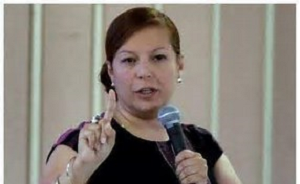A Message to the Rhode Island Community

Over the last few days, our country has been engaged in a very public conversation, with many having to take to the streets to protest in order to have their voices heard. The recent homicides of George Floyd, Breonna Taylor, and Ahmaud Arbery have been unacceptable acts fueled by ignorance and racism, and many have decided to no longer be silent and instead speak truth to power. The events that followed have caused us to reflect on our roles as educators regarding humanity, equity, and justice.
Pain, anger, and despair have led not just to protest, but to a heightened and unyielding demand for solutions that change the very system that allows these acts to happen. This is a historic time in our nation, one that we hope will be transformative and lead us to a better, shared future. However, transformative change is hard-earned. As educators, we have a responsibility to be on the right side of history by listening, by learning, by supporting, and by acting in ways that not only confront racist acts and individuals, but that dismantle racist policies, practices, and institutions. This is a time where we, as members of the education community of Rhode Island, need to take a stand and support our black students, their families, and our black colleagues by acknowledging their pain and frustration, saying publicly, “Enough is enough!”
I am so grateful to be here in Rhode Island. My family and I have been welcomed by the community in ways we could have never imagined. This has been an incredible year full of great moments, but also painful realizations about the magnitude of the work that lies ahead. Soon after beginning my tenure as Commissioner, we started meeting with teachers of color statewide. We heard from countless adults who had experienced racism in the workplace and felt powerless to enact change. I was devastated. As a 20-year veteran in this field, I hold exceptionally high expectations for educators and expect schools to be places where diversity of thought is encouraged.
Meritocracy is a core belief held by so many in our field. In education, we are taught to think about our field as the great equalizer. But we must confront the hard truth that our schools and our education system have contributed to the inequities in our society. As adults, we are often reluctant to acknowledge and confront the heart of an issue. We must not pass this problem on to the next generation of leaders and thinkers.
I am a woman of color married to a well-educated black man. My husband proudly served in the Army, including two tours in Iraq, to protect our nation and our values. He is an MIT, Howard, and Columbia grad and has achieved considerable career success. Still, he knows first-hand that his education does not protect him from the cruel realities of racism that impact all men of color in this country. I fear for my own son, who is black and on the spectrum. When my son is no longer viewed by the world as cute and curious, will he suddenly be perceived as a threat? This is the type of question that many mothers and fathers of color confront as we go to bed each night.
As we reflect on our education system, I urge us to consider how education disparities mirror and affect health disparities during this global pandemic. Here in our great state of Rhode Island and across the country, people of color have been disproportionately hurt by the COVID-19 virus. This pandemic has magnified what many educators already knew: Our most vulnerable are living on top of a foundation riddled with holes and missing key supports.
With deep pride, I can personally attest that when COVID-19 hit our communities, educators across Rhode Island rallied and created a new system based on distance-learning to continue education. We immediately organized and responded in a way that has made the system more equitable. We persevere as a community – and the nation has taken notice. We have shown that we are leaders during times of turmoil and despair, if we jump in and work together instead of acting as complicit bystanders. Today my community is hurting. I am hurting as a woman, a wife, a mother, and an educator. This pain is rooted in the lived reality of so many people of color in this nation. And it is that collective pain that must be the impetus for a way forward.
As Commissioner of Education, I am committed to continue to lead the change that is necessary to meet the needs of all of our students. My commitment fuels every decision I have made since I arrived in Rhode Island. We will take our efforts to a new level. To start, as an agency, RIDE is preparing to undergo internal equity work that will better position our staff to make equitable policy and implement culturally-responsive and sustaining education to help all educators create student-centered learning environments that affirm cultural identities, foster academic outcomes, and elevate marginalized voices.
Further, we will be hosting a series of conversations with students, educators, school and district leaders, and community members so we can foster change and ensure that conversation leads to action. In the long term, we will develop and implement a plan that addresses the systemic injustices in our education communities.
I ask that each of us reflect on these questions: Will we join the struggle to seek justice and equality? Will we have the courage to build a more robust educational system that addresses racism and social inequities in earnest? I ask that we commit as a community to lead with courage and compassion. This is our moral imperative. Enough is enough!
Angélica Infante-Green
Un Mensaje para la Comunidad Educativa de Rhode Island

En los últimos días, nuestro país ha estado involucrado en una conversación muy pública, y muchos tuvieron que salir a las calles y protestar para que sus voces fueran escuchadas. Los recientes homicidios de George Floyd, Breonna Taylor y Ahmaud Arbery han sido actos inaceptables alimentados por la ignorancia y el racismo, y muchos han decidido no permanecer en silencio y en su lugar utilizar sus voces para decir la verdad. Los eventos que siguieron nos han llevado a reflexionar sobre nuestro papel como educadores con respecto a la humanidad, la equidad y la justicia.
El dolor, la ira y la desesperación han llevado no solo a protestar, sino a una mayor e inquebrantable demanda de soluciones para que cambien el sistema que permite que estos actos sucedan. Este es un momento histórico en nuestra nación, que esperamos sea transformador y nos lleve a un futuro mejor y compartido. Sin embargo, el cambio transformador se gana con esfuerzo. Como educadores, tenemos la responsabilidad de estar en el lado correcto de la historia escuchando, aprendiendo, apoyando y actuando de manera que no solo confronte los actos e individuos racistas, sino que desmantele las políticas, prácticas e instituciones racistas. Este es un momento en el que nosotros, como miembros de la comunidad educativa de Rhode Island, debemos adoptar una posición y apoyar a nuestros estudiantes de color, sus familias y nuestros colegas de color al reconocer su dolor y frustración, diciendo públicamente: “¡Ya es suficiente! “
Estoy muy agradecida de estar aquí en Rhode Island. Mi familia y yo hemos sido recibidos por la comunidad de formas que nunca podríamos haber imaginado. Este ha sido un año increíble lleno de grandes momentos, pero también de dolorosas realizaciones sobre la magnitud del trabajo que nos espera. Poco después de comenzar mi mandato como Comisionada, comenzamos a reunirnos con maestros de color en todo el estado. Escuchamos a innumerables adultos que habían experimentado racismo en el lugar de trabajo y se sentían impotentes para implementar el cambio. Estaba devastada. Como veterana de 20 años en esta profesión, tengo expectativas excepcionalmente altas para los educadores y espero que las escuelas sean lugares donde se fomente la diversidad de pensamiento.
Muchos en nuestra profesión creen que si nos esforzamos, podemos ser exitosos por nuestro propio mérito. En educación, se nos enseña a pensar en nuestra profesión como el gran ecualizador. Pero debemos enfrentar la dura verdad de que nuestras escuelas y nuestro sistema educativo han contribuido a las inequidades en nuestra sociedad. Como adultos, a menudo somos reacios a reconocer y confrontar el corazón de un problema. No debemos transmitir este problema a la próxima generación de líderes y pensadores.
Soy una mujer de color casada con un educado hombre de color. Mi esposo sirvió con orgullo en el Ejército, incluidas dos giras en Irak, para proteger a nuestra nación y nuestros valores. Es graduado del MIT, Howard y Columbia y ha logrado un considerable éxito profesional. Aún así, él sabe de primera mano que su educación no lo protege de las crueles realidades del racismo que afectan a todos los hombres de color en este país. Temo por mi propio hijo, que es de color y está en el espectro. Cuando mi hijo ya no sea visto por el mundo como un niño lindo y curioso, ¿será percibido repentinamente como una amenaza? Este es el tipo de pregunta que muchas madres y padres de color enfrentan cuando nos vamos a la cama todas las noches.
Al reflexionar sobre nuestro sistema educativo, les insto a considerar cómo las disparidades educativas reflejan y afectan las disparidades de salud durante esta pandemia global. Aquí, en nuestro gran estado de Rhode Island y en todo el país, el virus COVID-19 ha affectado desproporcionadamente a las personas de color. Esta pandemia ha magnificado lo que muchos educadores ya sabían: nuestros más vulnerables viven encima de una base plagada de agujeros y falta de soportes clave.
Con profundo orgullo, personalmente puedo dar fe de que cuando COVID-19 llegó a nuestras comunidades, los educadores de Rhode Island se unieron y crearon un nuevo sistema basado en el aprendizaje a distancia para continuar la educación. Inmediatamente nos organizamos y respondimos de una manera que ha hecho que el sistema sea más equitativo. Perseveramos como comunidad, y la nación se ha dado cuenta. Hemos demostrado que somos el tipo de
personas que lideramos en tiempos de agitación y desesperación, si nos unimos y trabajamos juntos en lugar de actuar como cómplices y no como espectadores. Hoy mi comunidad está sufriendo. Me duele como mujer, esposa, madre y educadora. Este dolor está enraizado en la realidad vivida de tantas personas de color en esta nación. Y es ese dolor colectivo el que debe ser el impulso para avanzar.
Como Comisionada de Educación, estoy comprometida a continuar liderando el cambio que es necesario para satisfacer las necesidades de todos nuestros estudiantes. Mi compromiso alimenta cada decisión que he tomado desde que llegué a Rhode Island. Llevaremos nuestros esfuerzos a un nuevo nivel. Para comenzar, como agencia, el Departamento de Educación “RIDE” se está preparando para someterse a un trabajo de equidad interna que posicionará mejor a nuestro personal para elaborar políticas equitativas e implementar una educación sostenible y culturalmente receptiva para ayudar a todos los educadores a crear entornos de aprendizaje centrados en los estudiantes que afirmen las identidades culturales, fomenten el desarrollo académico, proporcionen resultados y eleven las voces marginadas.
Además, organizaremos una serie de conversaciones con estudiantes, educadores, líderes escolares y los superintendentes y miembros de la comunidad para que podamos fomentar el cambio y garantizar que la conversación conduzca a la acción. A largo plazo, desarrollaremos e implementaremos un plan que aborde las injusticias sistémicas en nuestras comunidades educativas.
Pido que cada uno de nosotros reflexione sobre estas preguntas: ¿Nos uniremos a la lucha para buscar justicia e igualdad? ¿Tendremos el coraje de construir un sistema educativo más robusto que aborde el racismo y las desigualdades sociales en serio? Pido que nos comprometamos como comunidad a liderar con coraje y compasión. Esta es nuestra responsabilidad moral. ¡Ya es suficiente!
Angélica Infante-Green
